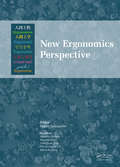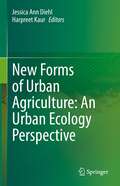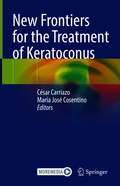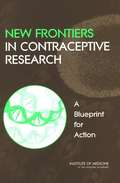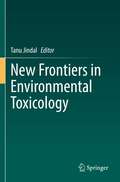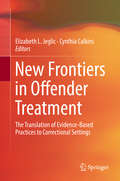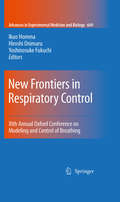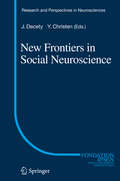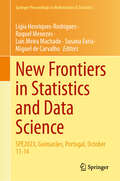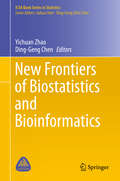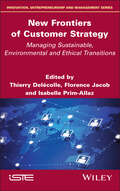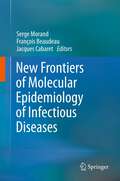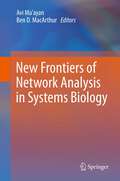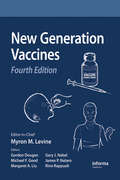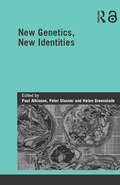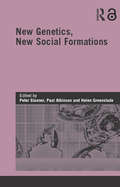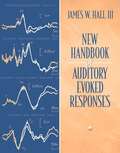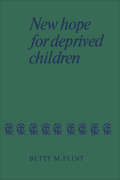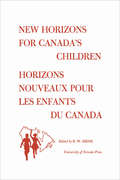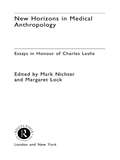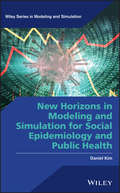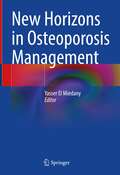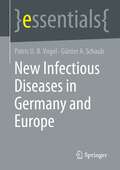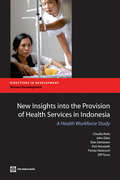- Table View
- List View
New Ergonomics Perspective: Selected papers of the 10th Pan-Pacific Conference on Ergonomics, Tokyo, Japan, 25-28 August 2014
by Sakae YamamotoNew Ergonomics Perspective represents a selection of the papers presented at the 10th Pan-Pacifi c Conference on Ergonomics (PPCOE), held in Tokyo, Japan, August 25-28, 2014.The first Pan-Pacific Conference on Occupational Ergonomics was held in 1990 at the University of Occupational and Environmental Health, Japan. The main theme of the PPCOE 1990
New Feminist Stories of Child Sexual Abuse: Sexual Scripts and Dangerous Dialogue
by Sam Warner Paula ReaveyThe international feminist contributors to this book look through the lens of poststructuralism at how child sexual abuse is differently represented and understood in the populist, academic, clinical, media and legal contexts. Reworking earlier feminist analyses, they show how child sexual abuse is not just about gender and power but also about class, race and sexuality. The first, theoretical section of the book critiques normative theories of the 'effects' of abuse, explores the impact and consequences of feminist interventions and critically examines the potential usefulness of a feminist post-stucturalist approach. In the second part, these understandings are applied to specific arenas of practice with the aim of providing a framework for critical intervention and alternative and better ways of working with child sexual abuse.
New Forms of Urban Agriculture: An Urban Ecology Perspective
by Harpreet Kaur Jessica Ann DiehlEating locally and developing an urban-rural food continuum is a rapidly evolving movement. Integration of multi-functional forms of agriculture — termed New Forms of Urban Agriculture (NFUA) — could be a critical adaptation to strengthen this movement and for the sustainability of cities. While NFUA have the potential to provide diverse benefits to humans, there is an absence of reliable empirical data on the scale and impact of urban resources on NFUA which has a profound impact on its viability and sustainability. In this book, we shift the focus from how NFUA have potential to impact the urban system to investigate the potential impacts of urban resources on NFUA. Access to resources such as land, labour, clean water, etc. are major barriers to enter the agriculture sector in the cities; the chapters in this book present projects or reviews recent research on the subject from different cities in the world. This edited volume offers critical perspectives from diverse disciplines, expertise, and geographic contexts related to the actual and potential role of urban and peri-urban agriculture in the developing and the developed world where forms, adaptations, and debates around NFUA vary distinctively. Using and urban ecology lens, the book provides empirical evidence of how urban resources of land, water/waste, labour, and biodiversity impact NFUA.
New Frontiers for the Treatment of Keratoconus
by César Carriazo María José CosentinoThis book updates the reader about the latest bio-mechanical concepts underlying keratoconus diagnosis and the various treatment alternatives: from conventional alternatives with a real cost/benefit description, to some innovative alternatives that have come to the fore in recent years. It discusses the latest software and technology utilized in keratoconus diagnosis as well as the more innovative surgical techniques used to treat keratoconus.New Frontiers for the Treatment of Keratoconus represents an essential book for ophthalmologists and specialists in cornea and refractive surgery who are looking to position themselves at the forefront of the diagnosis and treatment of keratoconus.
New Frontiers in Contraceptive Research: A Blueprint for Action
by National Research CouncilMore than a quarter of pregnancies worldwide are unintended. Between 1995 and 2000, nearly 700,000 women died and many more experienced illness, injury, and disability as a result of unintended pregnancy. Children born from unplanned conception are at greater risk of low birth weight, of being abused, and of not receiving sufficient resources for healthy development. A wider range of contraceptive options is needed to address the changing needs of the populations of the world across the reproductive life cycle, but this unmet need has not been a major priority of the research community and pharmaceutical industry. New Frontiers in Contraceptive Research: A Blueprint for Action, a new report from the Institute of Medicine of the National Academies, identifies priority areas for research to develop new contraceptives. The report highlights new technologies and approaches to biomedical research, including genomics and proteomics, which hold particular promise for developing new products. It also identifies impediments to drug development that must be addressed. Research sponsors, both public and private, will find topics of interest among the recommendations, which are diverse but interconnected and important for improving the range of contraceptive products, their efficacy, and their acceptability.
New Frontiers in Environmental Toxicology
by Tanu JindalThis volume provides up-to-date information on toxic pollutants in the environment and their harmful effects on human health and nature. The book covers many important aspects of environmental toxicology, such as features, characterization, applications, environmental routes for dispersion, nanotoxicity, ecotoxicity and genotoxicity of nanomaterials, with emphasis on radiation toxicology, polar ecotoxicology, plastic toxicology, microbrial toxicology, nanotoxicology and pesticide toxicology. Also discussed is the use of microbes and nanotechnology for medicinal purposes, which has revealed important chemical prototypes in the discovery of new agents, stimulating the use of refined physical techniques and new syntheses of molecules with pharmaceutical applications for human welfare. The chapters also address the fate of nanoparticles in the environment, as well as nanotoxicology mechanisms impacting human health. The book will be of interest to toxicologists, environmental scientists, chemists, and students of microbiology, nanotechnology and pharmacology.
New Frontiers in Offender Treatment: The Translation of Evidence-Based Practices to Correctional Settings
by Elizabeth L. Jeglic Cynthia CalkinsThis book reviews how new and promising evidence-based interventions are being used with those involved in the criminal justice system. While there has been an increased emphasis on evidence-based practice within forensic treatment, there remains a disjoint between what we know works and adapting these interventions to those involved in the criminal justice system. This book seeks to bridge that gap by providing an overview of what we know works and how that information has been translated into offender treatment. In addition, it highlights avenues where additional research is needed. This book is comprised of three parts:In the first part, current models of correctional treatment including the Risk, Needs, Responsivity Model, The Good Lives Model and Cognitive Behavioral Models are presented. In the second part, the chapters address clinical issues such as the therapeutic alliance, clinician factors, and diversity related issues that impact treatment outcome. In the third and final part of the book, adaptions of innovative and cutting-edge evidence-based treatments such as Dialectical Behavior Therapy, Trauma Informed Care, Mindfulness, Motivational Interviewing, Assertive Community Treatment, Multisystemic Treatment, New frontiers in Intimate Partner Violence treatment, and the current research on the treatment of those with psychopathy are presented. Research supporting these treatment approaches targeting areas such as self-management, psychological well-being, treatment engagement and retention and their relationship to recidivism will be reviewed, while their adaptation for use with forensic populations is discussed. The book concludes with the editors’ summary of the findings and a discussion of the future of evidence-based interventions within the field of forensic psychology.
New Frontiers in Respiratory Control
by Hiroshi Onimaru Ikuo Homma Yoshinosuke FukuchiThe Oxford Conference has been first held at Oxford University in 1948. Since then, it has been held every three years in various countries to exchange ideas and learn the latest findings on the control of respiration. The XIth Oxford Conference will focus on respiratory control, especially on the topics of respiratory rhythm generation and chemoreception. Clinical research on sleep apnea syndrome will also be an important subject at the meeting.
New Frontiers in Social Neuroscience
by Jean Decety Yves ChristenTraditionally, neuroscience has considered the nervous system as an isolated entity and largely ignored influences of the social environments in which humans and many animal species live. However, there is mounting evidence that the social environment affects behavior across species, from microbes to humans. This volume brings together scholars who work with animal and human models of social behavior to discuss the challenges and opportunities in this interdisciplinary academic field.
New Frontiers in Statistics and Data Science: SPE2023, Guimarães, Portugal, October 11-14 (Springer Proceedings in Mathematics & Statistics #469)
by Lígia Henriques-Rodrigues Miguel De Carvalho Raquel Menezes Luís Meira Machado Susana FariaThis volume showcases a collection of thirty-two peer-reviewed articles presented at the XXVI Congress of the Portuguese Statistical Society (2023). It covers a wide range of cutting-edge topics in both theoretical and applied statistics. Each contribution highlights the latest advancements and research in the field, offering valuable insights and innovative methodologies for researchers and practitioners alike. Readers with a background in mathematics and statistics will find it particularly beneficial, while researchers from various scientific disciplines can explore numerous robust applications.
New Frontiers of Biostatistics and Bioinformatics (ICSA Book Series in Statistics)
by Ding-Geng Chen Yichuan ZhaoThis book is comprised of presentations delivered at the 5th Workshop on Biostatistics and Bioinformatics held in Atlanta on May 5-7, 2017. Featuring twenty-two selected papers from the workshop, this book showcases the most current advances in the field, presenting new methods, theories, and case applications at the frontiers of biostatistics, bioinformatics, and interdisciplinary areas.Biostatistics and bioinformatics have been playing a key role in statistics and other scientific research fields in recent years. The goal of the 5th Workshop on Biostatistics and Bioinformatics was to stimulate research, foster interaction among researchers in field, and offer opportunities for learning and facilitating research collaborations in the era of big data. The resulting volume offers timely insights for researchers, students, and industry practitioners.
New Frontiers of Customer Strategy: Managing Sustainable, Environmental and Ethical Transitions
by Isabelle Prim-Allaz Florence Jacob Thierry DelécolleDigital transformation has shaped a new landscape for companies and their customers, offering companies a wealth of data with which to develop customer knowledge. However, this evolution is just one of many transformations in customer marketing within an increasingly complex reality, thrown into turmoil by environmental and social changes. New frontiers in customer relations strategies are thus being drawn, some in new territories grounded in efforts to preserve scarce resources, while others are built on expectations of social responsibility. These profound societal changes also reveal darker frontiers, where companies have insufficient ethical considerations for vulnerable customers, or merely react to changes in legislation. New Frontiers of Customer Strategy offers practitioners, lecturers and students an up-to-date reflection on the role of customer relations now and in the future, to keep pace with environmental, digital, inclusive and ethical issues, as well as organizational governance.
New Frontiers of Molecular Epidemiology of Infectious Diseases
by Serge Morand Jacques Cabaret François BeaudeauMolecular epidemiology has recently broaden its focuses due to the development of molecular tools but also by incorporating advances of other fields such as mathematical epidemiology, molecular ecology, population genetics and evolution. Facing new risks of emerging and re-emerging infectious diseases that are threats for humans and their livestock, the objectives of molecular epidemiology include: - the development of molecular tools, genotyping and gene expression - the incorporation of concepts and results of population genetics of infectious diseases - the integration of recent advances in theoretical epidemiology and evolutionary ecology of diseases - a better understanding of transmission for the development of risk factors analyses. This book will demonstrate how the latest developments in molecular tools and in epidemiology can be integrated with studies of host-pathogen interactions. Besides a strong theoretical component, there will also be an emphasis on applications in the fields of epidemiology, public health, veterinary medicine, and health ecology. Students and researchers in the fields of epidemiology, animal and human health, evolutionary ecology, parasitology are the main potential readers of the book, as well as a broader audience from veterinary medicine and conservation.
New Frontiers of Network Analysis in Systems Biology
by Avi Ma'Ayan Ben D. MacarthurThe rapidly developing field of systems biology is influencing many aspects of biological research and is expected to transform biomedicine. Some emerging offshoots and specialized branches in systems biology are receiving particular attention and are becoming highly active areas of research. This collection of invited reviews describes some of the latest cutting-edge experimental and computational advances in these emerging sub-fields of systems biology. In particular, this collection focuses on the study of mammalian embryonic stem cells; new technologies involving mass-spectrometry proteomics; single cell measurements; methods for modeling complex stochastic systems; network-based classification algorithms; and the revolutionary emerging field of systems pharmacology.
New Generation Vaccines
by Myron M. LevineHighlighting the latest activities and initiatives of prominent organizations working in the vaccine industry such as the Bill and Melinda Gates Foundation, The Global Alliance for Vaccines and Immunization, WHO, UNICEF, the World Bank, New Generation Vaccines, Fourth Edition, details steps developing countries have taken toward research, development, manufacture, and regulation of several new vaccines for widespread use.This text will:cover the current state-of-the-art techniques in vaccine development – including the successes and the failurestrace vaccine development from the bench to public health with regard to both FDA and European Union regulationsinvestigate improved methods for immunizing large populations, and the use of needless vaccinationsdiscuss the advancements in the heavily government-funded areas for developing vaccines against potential bioterror and infectious disease agents as well as the immunization of large population bases for diseases like: Anthrax, Smallpox, Ebola, West Nile, SARS, and othersUpdated throughout with new cutting-edge information on recent breakthroughs and developments.NEW TO GENERATION VACCINES, FOURTH EDITION:highlights the latest activities of prominent organizations in the vaccine industrycovers the current techniques in vaccine developmentinvestigates improved methods for immunizing large populations
New Genetics, New Identities (Genetics and Society)
by Paul Atkinson Peter Glasner Helen GreensladeWhat implications are applications of new genetic technologies in biomedicine having on social identity in today’s society? New Genetics, New Identities, a wide-ranging multi-disciplinary volume in the CESAGen Genetics & Society Book series, presents not only theoretical reflection but also empirical case studies drawn from an international array of authors. Including the highly controversial areas of reproductive technologies and use of human embryos in biomedical research, other key features include: a fresh analysis of a wide-range of social and political concerns in the development of new social identities examinations of the social implications of identity formation as a result from advances in genetic technologies from a number of perspectives both locally and globally resources of a wide range of social science disciplines to discuss significant sociological, anthropological, political and ethical issues. This superb collection is an essential informative read for postgraduates and academics in the fields of sociology, anthropology and scientific technologies giving a comparative approach to complex issues surrounding the social implications of these advances in a period of rapid social change.
New Genetics, New Social Formations (Genetics and Society)
by Paul Atkinson Peter Glasner Helen GreensladeNew genetic technologies cut across a range of public regulatory domains and private lifeworlds, often appearing to generate an institutional void in response to the complex challenges they pose. As a result, a number of new social formations are being developed to legitimate public engagement and avoid the perceived democratic deficit that may result. Papers in this volume discuss a variety of these manifestations in a global context, including: genetic data banks committees of inquiry non-governmental organisations (NGOs) national research laboratories. These institutions, across both health and agriculture, are explored in such diverse locations as Amazonia, China, Finland, Israel, the UK and the USA. This volume exhibits a clear thematic coherence around the impact of the new genetics and their associated technologies on new social formations, and the case studies included have a significant international focus, showing a balance between theoretical and empirical approaches in this rapidly changing field. This innovative new volume will be of interest to postgraduates and professionals in the fields of sociology, social anthropology, science and technology studies, and environmental studies.
New Handbook For Auditory Evoked Responses
by James HallThis practical and comprehensive sourcebook sets out to strengthen the practitioner's understanding of clinically important auditory evoked responses (AERs). It enhances understanding of the anatomy, measurement and interpretation of AERs, helps improve AER recording procedures using stimulus techniques, and introduces new evoked response patient services.
New Hope for Deprived Children
by Betty FlintNew Hope for Deprived Children is the carefully documented story of the development of a group of children from infancy through early adolescence. Exhibiting the effects of severe institutional deprivation in the early part of their lives, these children became the focus of a therapeutic programme within an institution designed to relieve their serious developmental deficiencies. The programme and its effects confirmed the faith of the researchers involved that recovery to a certain degree was possible, even with an institutional setting. Further recovery was effected by later placement in foster and adoptive homes. The lives of twenty-eight of these children have been recorded and the data analysed. This book presents their stories in both human and scientific terms. The guidance procedures and therapeutic intervention were based on a personality theory of 'security,' which allowed the research and guidance team to provide a consistent frame of reference to all procedures designed to move the children increasingly closer to 'normal' behaviour. The range of adaptation to homes and community reflects the individual capacities of each child and the capacities of each family to sponsor such individuality. Both the group analysis and the individual histories provide fascinating information and, additionally, pose many fundamental questions about human development.
New Horizons for Canada's Children/Horizons Nouveaux pour les Enfants du Canada: Proceedings of the first Canadian Conference on Children/Deliberations de la premiere Conference Canadienna de l'Enfance
by B. HeiseThe first Canadian Conference on Children, held in the province of Quebec in October, 1960, was the culmination of several years of planning and of three years' specific study of projects which dealt with existing programmes for children in Canada. Delegates came from provincial and national organizations and the Conference was supported by a large number of organizations connected with child health, welfare, and education. The programme of the Conference was divided into three sections: plenary sessions, group discussions of the projects, and group discussion of children under three headings: "the early years," "the middle years," and "the transition years." The whole programme covered children from birth to about the age of seventeen. The Proceedings includes the speeches presented at the plenary sessions (by Sir Geoffrey Vickers, Chairman of the Research Committee of the British Mental Health Research Fund; Dr. K.D. Naegele of the University of British Columbia; and Dr. Otto Klineberg of Columbia University); and valuable summaries of discussions by Dr. Murray Ross (York University), Mgr. Irénée Lussier (Université de Montréal), and Dr. N.A.M. MacKenzie (University of British Columbia).
New Horizons in Medical Anthropology: Essays in Honour of Charles Leslie (Theory And Practice In Medical Anthropology And International Health Ser.)
by Margaret Lock Mark NichterNew Horizons in Medical Anthropology is a festschrift in honor of Charles Leslie whose influential career helped shape this subfield of anthropology. This collection of cutting-edge essays explores medical innovation and medical pluralism at the turn of the 21st century. The book accomplishes two things: it reflects recent research by medical anthropologists working in Asia who have been inspired by Charles Leslie's writing on such topics as medical pluralism and the early emergence of what has become a globalized biomedicine, the social relations of therapy management, and the relationship between the politics of the state and discourse about the health of populations, illness, and medicine. The book also takes up lesser known aspects of Leslie's work: his contribution as an editor and the role he played in carrying the field forward; his ethics as a medical anthropologist committed to humanism and sensitive to racism and eugenics; and the passion he inspired in his co-workers and students.Charles Leslie is a remarkable and influential social scientist. New Horizons in Medical Anthropology is a fitting tribute to a sensitive scholar whose theories and codes of practice provide an essential guide to future generations of medical anthropologists.
New Horizons in Modeling and Simulation for Social Epidemiology and Public Health (Wiley Series in Modeling and Simulation)
by Daniel KimAn introduction to state-of-the-art modeling and simulation approaches for social and economic determinants of population health New Horizons in Modeling and Simulation for Social Epidemiology and Public Health offers a comprehensive introduction to modeling and simulation that addresses the many complex research questions in social epidemiology and public health. This book highlights a variety of practical applications and illustrative examples with a focus on modeling and simulation approaches for the social and economic determinants of population health. The book contains classic case examples in agent-based modeling (ABM) as well as essential information on ABM applications to public health including for infectious disease modeling, obesity, and tobacco control. This book also surveys applications of microsimulation (MSM) including of tax-benefit policies to project impacts of the social determinants of health. Specifically, this book: Provides an overview of the social determinants of health and the public health significance of addressing the social determinants of health Gives a conceptual foundation for the application of ABM and MSM to study the social determinants of health Offers methodological introductions to both ABM and MSM approaches with illustrative examples Includes cutting-edge systematic reviews of empirical applications of ABM and MSM in the social sciences, social epidemiology, and public health Discusses future directions for empirical research using ABM and MSM, including integrating aspects of both ABM and MSM and implications for public health policies Written for a broad audience of policy analysts, public planners, and researchers and practitioners in public health and public policy including social epidemiologists, New Horizons in Modeling and Simulation for Social Epidemiology and Public Health offers a fundamental guide to the social determinants of health and state-of-the-art applications of ABM and MSM to studying the social and economic determinants of population health.
New Horizons in Osteoporosis Management
by Yasser El MiedanyThis book provides a review of the most recent data on osteoporosis and bone health, presenting a vision of diagnosis and management for the year 2021 and beyond. It covers all pertinent aspects of bone health including diagnosis, fracture prevention, optimized practice, impaired orthostasis, and falls. The book examines recent developments in therapeutics, including goal-directed therapy, individualizing therapy, sequential and combined therapies, pharmaceuticals, and anabolic vs. antiresorptive therapy. In addition, it provides an in-depth overview of osteoporosis and bone health in complex patients, covering Duchene dystrophy, renal failure, periodontal diseases, and steroid-induced osteoporosis as well as considerations for pediatric populations and men. New Horizons in Osteoporosis Management is an essential resource for physicians and related professionals, residents, fellows, graduate students and nurses in rheumatology, endocrinology, radiology, pediatrics, primary care, and internal medicine.
New Infectious Diseases in Germany and Europe (essentials)
by Patric U. Vogel Günter A. SchaubThis essential presents infectious diseases of humans and animals that occur or can become endemic in Germany and Europe. These include current threats, African swine fever, avian influenza and COVID-19. In addition, the biology of mosquitoes is described. Globalisation and global warming favour the establishment of new mosquito species that can transmit viruses of the tropics and subtropics, e.g. chikungunya, dengue and West Nile virus. The Schmallenberg virus, which is of veterinary relevance, shows how rapidly new pathogens are spreading in Europe.
New Insights into the Provision of Health Services in Indonesia: A Health Work Force Study
by Claudia Rokx John Giles Puti Marzoeki Pandu Harimurti Elif Yavuz Elan SatriawanOver the past decade, Indonesia has implemented significant health sector reforms that include decentralizing responsibilities for service delivery, designing incentives for health providers, increasing the supply of midwives in remote areas, and analyzing demographic and epidemiological transitions causing changes in the patterns of disease prevalence. Financial protection against catastrophic expenditures has improved substantially, and legislation has been enacted to improve the quality of physician training and patient care. Despite the progress, substantial challenges remain and include comparatively low resources for the health sector, limitations in the supply of providers at the primary and hospital levels, inefficient payment systems, shortcomings in the quality of maternal and child and adult care, lack of oversight and effective licensing in an expanding private health sector, and ineffective planning for and recruitment and retention of health workers. Given the slow pace in improving health outcomes and limited evidence linking health performance and the health workforce, the need to make more information available about past experiences to inform future policy changes is pressing. Few studies have been undertaken to measure the actual impact of the reforms and the remaining challenges. 'New Insights into the Provision of Health Services in Indonesia: A Health Workforce Study' begins the process, providing real time evidence-based inputs to facilitate the Government of Indonesia's comprehensive health sector review. The authors' analysis of panel data from households and health providers will assist the government's assessment of the impact of past health work force policies and its consideration of policy changes.
